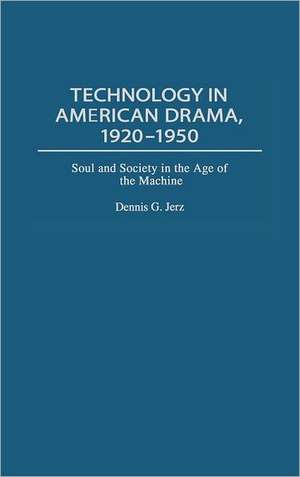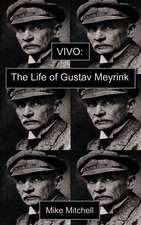Technology in American Drama, 1920-1950: Soul and Society in the Age of the Machine
Autor Dennis G. Jerzen Limba Engleză Hardback – 29 mar 2003 – vârsta până la 17 ani
Preț: 286.03 lei
Preț vechi: 348.87 lei
-18% Nou
Puncte Express: 429
Preț estimativ în valută:
54.74€ • 56.82$ • 45.64£
54.74€ • 56.82$ • 45.64£
Carte tipărită la comandă
Livrare economică 24 martie-07 aprilie
Preluare comenzi: 021 569.72.76
Specificații
ISBN-13: 9780313321726
ISBN-10: 0313321728
Pagini: 184
Dimensiuni: 156 x 235 x 20 mm
Greutate: 0.43 kg
Ediția:New.
Editura: Bloomsbury Publishing
Colecția Praeger
Locul publicării:New York, United States
ISBN-10: 0313321728
Pagini: 184
Dimensiuni: 156 x 235 x 20 mm
Greutate: 0.43 kg
Ediția:New.
Editura: Bloomsbury Publishing
Colecția Praeger
Locul publicării:New York, United States
Notă biografică
Dennis G. Jerz is Assistant Professor of English at University of Wisconsin, Eau Claire, where he studies literary representations of interactions between humans and machines. He has published a computer simulation of the motion of pageant wagons in the medieval York Corpus Christi pageant, articles about teaching English via the Web, and an annotated bibliography of scholarship on text-based computer games.
Cuprins
IntroductionThe Americanization of Expressionism: The Hairy Ape (1922) and The Adding Machine (1923)Sensualizing and Sanctifying Technology: Machinal (1928), The Subway (1929), and Dynamo (1929)Theater of the Thirties: Machines to Socialize the Soul: Waiting for Lefty (1935), Altars of Steel (1937), and O! Pyramids (1933)Balancing the Nuclear and the Greater Human Family: The Skin of Our Teeth (1942) and All My Sons (1947)Emotionally and Thematically Integrated Technology: A Streetcar Named Desire (1947) and Death of a Salesman (1949)ConclusionWorks Consulted













